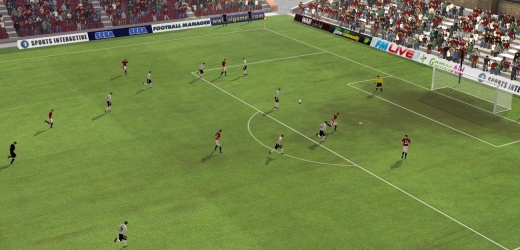Our Verdict
Demands more work than its predecessors. Get it right and theres little as satisfying, but its easier than ever to get it wrong.
PC Gamer's got your back
In a pretend press conference, I'm being asked multiple choice questions by a faceless interviewer. It's my first season in Football Manager 2011 and I intend to take it seriously. To help me see through the clinical stylings of the game's UI, I imagine I'm being asked these questions by a beige PC wearing a reporter's hat.
“Is this your dream job?” Yes, I suppose it is. If I had to tell a squad of man-children how to punt a ball around an enclosed grassy oblong, well, yes, I'd like to do it at Leicester City, my hometown team. But I'm being cagey – FM 2011 does its best to stamp the importance of media comments in keeping players sweet, and I don't want to throw my new underlings off with fawning praise. “I won't be commenting on that.”
Press conference concluded, I didn't get much of a reaction. In my inherited squad, I see even my most valuable players aren't really fussed – except veteran left-back Bruno Berner, who displays his thoughts on my appointment via a little green box next to his name. He's worried about my relative inexperience.
Don't worry, Bruno. In previous Football Managers I've taken Reading to a fourth place Premiership finish and I've won the FA Cup with High Wycombe. You stick to what you do best, Bruno – gently toddling up and down the left flank and missing too many tackles – and I'll play FM the way I always have: Harry Redknapp with ADD. I'm a poacher, basing my team's backbone around whatever's available at the moment: I take the best players I can get for the transfer budget I've been handed and jam them into a system that doesn't always fit their talents. Not pretty, but, in previous FMs, effective.
Mess with Bruno
Bruno's misgivings are minor detractions from the traditional pillars of Football Manager: transfers, training and tactics. These elements remain – on the surface – near unchanged. The game's transfer database is still a leviathan, detailed to the point of mania and so accurate that real talent scouts use it.
Training keeps the simple five-star system, but has also been fiddled to allow building of individual skills. Compulsive tweakers can now hone their game, getting players to develop new skills or focus on existing ones. For my own laissezfaire management, I just issued a happy “OK!” when any backroom staff suggested an individual training program – which seemed to pay off in attribute bonuses.
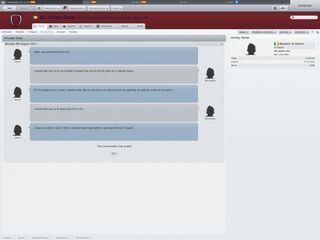
The ephemera, the touchy-feely talky stuff, has never made much of a dent on the series, previously draped over the game like an overlay. As Leicester's manager, I clicked through screen after screen until I'd found the best players for the cheapest prices, forced them into a 4-4-2 and started the season. I sent my assistant to every press conference and dismissed out of hand the new backroom advice provided by my coaching staff.
Later, when Bruno came to complain about a lack of discipline in the squad, I tried to wave him off. I clicked on the nebulous “I'll deal with it” option, and focussed on the next game. I wanted to get this pretend man out of my pretend office. “I don't believe you,” he fired back. What? Don't talk to me like that, you ingrate. “I am the manager of this club!” I said via the aggressive multiple choice option. Bruno stormed out, his morale arrow turning red and pointing down.
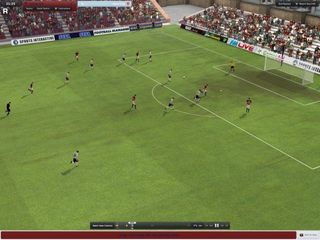
It was the beginning of the end for my Leicester squad. Bruno had identified an endemic problem, and my next few weeks were spotted with players complaining about discipline issues. I started losing, and morale slipped as I sent my assistant to deal with the press. My few successes came in the transfer market – FM 2011's new agents are set up with their own traits, but all those I dealt with seemed to be easily bypassed by the simple act of asking what they wanted for their client's services, knocking the wage slider down a few notches, then pressuring for a deal. Adding these agents adds a touch of realism to proceedings, but the general overhaul of the transfer system is a bigger update, managers now getting responses from prodded players with comforting speed and believable pay demands.
FM 2011 doesn't do a good job of explaining how a problem can be fixed. Prior to and during a match, you're offered single-sentence snippets of advice: “Cardiff don't do well against 4-5-1 formations,” or “Aston Villa do well against high tempo teams”. The natural reaction is to head into the team instructions tab and jiggle the gauges. Against narrow teams, I flipped my game to play wider and still lost; against high tempo gangs I went for a containing philosophy, to frustrate opponents into knackering themselves. They'd just nick the ball and score. The only direct feedback is victory, a very specific event that – if read wrong – could cement a bad tactic. With so many variables, I got disheartened and flitted between concepts faster than my players could adapt to them.
“Prediction baffling”
I started lashing out wildly, fining players for getting yellow cards and screaming at them in the dressing room. With morale for my entire team 'very poor', I went on a sixgame losing streak, the longest in Leicester's history. I was sacked.
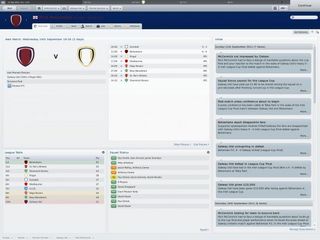
The job market is tough for an ex-Sunday league footballer with six months of management and an unceremonious sacking on his CV. I could've started fresh, elbowed my way into a new team to fuck up in more interesting ways, but I decided I needed penance. Six months after I left Leicester, half an in-game year spent perusing the job boards, applying for jobs at clubs from Brazil to Bray Wanderers, I landed my second role – at Irish Premier League outfit Galway United.
Time to play things differently. I'd come to respect FM 2011's two big innovations: media influence and player interactions, and went into my first press conference as Galway boss buoyed, ready for questions from all comers. First, who did I think would win the Irish Premier Division this year? Galway United, of course! I cheerily fielded all questions, loudly proclaiming this club I'd never heard of to be my dream assignment, and praising players who worked in banks and shops when they weren't doing simple training drills.
It wasn't until I got the feedback from the single local paper that I saw the problem. My time off had made me complacent, and I hadn't checked Galway's league standing: there was no mathematical way we could win the league. They ran the headline: “McCormick's prediction baffling.”
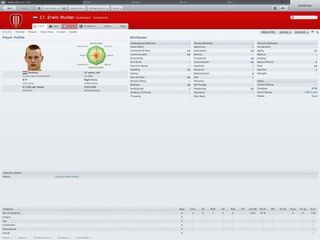
Luck of the Irish?
It nearly worked. Proclaiming my part-timers God's gift to kicking little balls swelled their confidence. Throughout my team, little 'PR' symbols appeared, players pleased with my comments. Sifting through personality traits on individual stat screens, I spoke to players one by one, discussing problems with the flighty ones and asking the levelheaded ones for transfer advice. On my managerial overview screen the 'player interaction' bar slid upwards, my team's morale rising with it.
Matches made sense as I got to know the capabilities of my squad. Tying together a truly incisive formation is still incredibly tough – demanding genuine football knowledge and an eye for numbers to know whether your new man is really better suited to playing the Trequartista role, whether other players have the passing skill to feed a Trequartista, or what the piss a Trequartista even is. But familiarity breeds victories, and FM 2011 rewards those who can pull specific statistics from memory and deploy their squad accordingly.
I was still relegated. Galway's team was woeful, and support for me soon wavered after I found the 'storm out of press conferences for no reason' button. But morale rarely dropped below 'okay', and my performances were held up as 'brave' by the single news outlet that bothered to cover my games. A year down the line, the board were satisfied with the changes I'd brought to Galway United – much as I am with Football Manager 2011. Like the game, I'd ushered in a more communicative, reactive and complicated approach to the sport. It's a style that isn't to the tastes of the hands-off gaffer, but it's the necessary state of football management – both real and computerised – in 2011.
For Further Reading : PCG's Guide to assembling a super team of cheap youngsters.
Demands more work than its predecessors. Get it right and theres little as satisfying, but its easier than ever to get it wrong.

Today's Wordle answer for Sunday, January 26

A Warhammer 'live service RPG' made in Unreal Engine 5 was apparently canceled after three years of development

After turning over a new, crypto-free leaf, Atari would like to stress that the meme currency 'RealPongCoin' does not have its 'consent or approval'
